|
|
 |
Fiche d'espèce de Copépode |
|
|
Calanoida ( Ordre ) |
|
|
|
Clausocalanoidea ( Superfamille ) |
|
|
|
Aetideidae ( Famille ) |
|
|
|
Bradyidius ( Genre ) |
|
|
| |
Bradyidius pacificus (Brodsky, 1950) (F,M) | |
| | | | | | | Syn.: | Undinopsis pacificus Brodsky, 1950 (1967) (p.150, figs.F,M); Ohashi & al., 2013 (p.44, Table 1, Rem.) | | | | Ref.: | | | Park, 1966 (p.810); Bradford, 1976 a (p.6: Rem.); Othman & Greenwood, 1987 (p.1137); Markhaseva, 1996 (p.74, figs.F,M); Sedova & al., 2009 (p.17, figs.F, variations) | 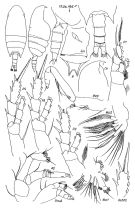 issued from : E.L. Markhaseva in Trudy Zool. Inst. RAN, St. Petersburg, 1996, 268. [p.77, Fig.55]. Female (from Sea of Okhotsk). R: rostrum (anterior); Re: exopod; P.md: mandibular palp; Ce: forehead (lateral); Gn: genital segment.
|
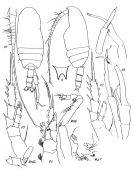 issued from : E.L. Markhaseva in Trudy Zool. Inst. RAN, St. Petersburg, 1996, 268. [p.78, Fig.56]. Male (from Sea of Okhotsk). R: rostrum (anterior).
|
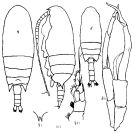 Issued from : K.A. Brodskii in Calanoida of the Far Eastern Seas and Polar Basin of the USSR. Opred. Fauna SSSR, 1950, 35 (Israel Program for Scientific Translations, Jerusalem, 1967) [p.151, Fig.65]. As Undinopsis pacificus. Female (from NW Pacif.): habitus (dorsal and lateral left side); R, rostrum; S1, P1. Male: habitus (dorsal); S5, P5.
|
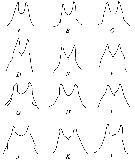 issued from : N.A. Sedova, A.S. Grigoryev & S.S. Grigoryev in Zoosyst. Rossica, 2009, 18 (1). [p.18, Fig.1]. Female: A-L, rostrum variation. Nota: There were 12 variants observed.
|
 issued from : N.A. Sedova, A.S. Grigoryev & S.S. Grigoryev in Zoosyst. Rossica, 2009, 18 (1). [p.21, Fig.3, A]. Female: A, A1. Nota: A1 24-segmented. Shape and relative lengths of the segments being constant features; the variables are found to be number and structure of setae on the majority of segments. Structural changes were observed: change in length of a particular seta (segments 2, 8, 9, 18); addition of a seta or a spinule (segments 8, 17); transformation of seta into thin spinule (segments 2, 9, 12, 14-16, 22); feathering of a seta (segment 56); reduction of a seta (segment 5, 9, 11, 18); various changes in shape (segments 21-24); The setation of segments 1, 3, 4, 6, 7, 10, 13, 19, and 20 proved to be invariable.
|
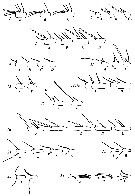 issued from : N.A. Sedova, A.S. Grigoryev & S.S. Grigoryev in Zoosyst. Rossica, 2009, 18 (1). [p.20, Fig.2]. Female: Structure variants of individual segments of A1. Numbers denote segments, letters denote variants.
|
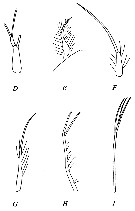 issued from : N.A. Sedova, A.S. Grigoryev & S.S. Grigoryev in Zoosyst. Rossica, 2009, 18 (1). [p.21, Fig.3, D-I]. Female: D-I, various malfomed setae on segments of A1. Nota: The 21st segment normally has 2 setae on different sides (see Fig.2, 21A), one of which often had different structure, more often on only one A1, Fig.3F (see Fig.2, 21C); there was one specimen with very different structure of one seta Fig.3D (see Fig.2, 21D). Fig.3g, short-feathered seta on the 23 rd segment (see A1, fig.2, 23A), one of which (fig.3, H) very rarely feathered and bifurcated (Fig.2, 23B). The 24th segment has one distal seta trifurcated Fig.3 H (see fig.2, 24B).
|
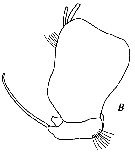 issued from : N.A. Sedova, A.S. Grigoryev & S.S. Grigoryev in Zoosyst. Rossica, 2009, 18 (1). [p.21, Fig.3, B]. Female: B, basipodite of A2. Nota: The structure of A2 was typical in most cases. One specimen had an anomaly (a double projection and additional hairs on the 2nd basipod segment).
|
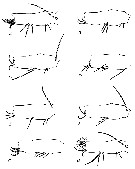 issued from : N.A. Sedova, A.S. Grigoryev & S.S. Grigoryev in Zoosyst. Rossica, 2009, 18 (1). [p.22, Fig.4]. Female: a-H, structure variants of Mxp. Nota: The number of setae in the middle of protopodite is known to vary in genus Bradyidius. There were 8 variants of protopodites
|
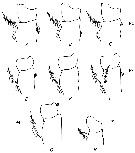 issued from : N.A. Sedova, A.S. Grigoryev & S.S. Grigoryev in Zoosyst. Rossica, 2009, 18 (1). [p.23, Fig.5]. Female: a-c, basipodites of P2; d-f, same of P3; g, same of P4; h, same of P1. Nota: There were up to 3 variants of structure of basipodites of pereiopods. Nota: There were only sporadic cases of anormal structure of individual periopods (considered as monstrosities). Usually, variable features were only number and structure of spines on the outer margins of coxopodites of P2-P4. Usually there were no spinules on P1 except for two specimens having 2 thin spinules there (Fig.5H). Very rarely there were several spinules on the basipodites of P4 (Fig.5G).
|
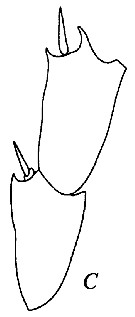 issued from : N.A. Sedova, A.S. Grigoryev & S.S. Grigoryev in Zoosyst. Rossica, 2009, 18 (1). [p.21, Fig.3 C]. Female: C, exopodites 1 and 2 of P4. Nota: One fspecimen shows 2 thin lateral spines on exopodites 1 and 2 of P4.
|
 Bradyidius pacificus Bradyidius pacificus female: 1 - Rostrum with non divergent and parallel rami. 2 - Points of last thoracic segment reaching posterior third of genital segment. A1 reaching nearly the midlength of urosome.
|
 Bradyidius pacificus Bradyidius pacificus male: 1 - P5 biramous. 2 - Endopod of left P5 1-segmented. 3 - Points of last thoracic segment short, not reaching posterior border (dorsal and lateral view). P5 nearly twice longer than urosome 4 - Endopod segment 1 of P1 without external spine..
| | | | | Ref. compl.: | | | Markhaseva, 1998 (p.250, Fig.2); Pinchuk & Paul, 2000 (p.4, table 1, % occurrence); Ikeda & al., 2006 (p.1791, Table 2) | | | | NZ: | 1 | | |
|
Carte de distribution de Bradyidius pacificus par zones géographiques
|
| | | | Loc: | | | Station Knot, N Okhotsk Sea, Bering Sea, S Sakhalin (Bragina, 2006, pers. comm.) | | | | N: | 8 | | | | Lg.: | | | (22) F: 4,4; M: 3,3; (37) F: 4,5-4,4; (1091) F: 3,2-4,9; {F: 3,20-4,90; M: 3,30} | | | | Rem.: | épi & bathypélagique (1000 m).
Voir aussi les remarques en anglais | | | Dernière mise à jour : 21/02/2019 | |
|
|
 Toute utilisation de ce site pour une publication sera mentionnée avec la référence suivante : Toute utilisation de ce site pour une publication sera mentionnée avec la référence suivante :
Razouls C., Desreumaux N., Kouwenberg J. et de Bovée F., 2005-2025. - Biodiversité des Copépodes planctoniques marins (morphologie, répartition géographique et données biologiques). Sorbonne Université, CNRS. Disponible sur http://copepodes.obs-banyuls.fr [Accédé le 26 décembre 2025] © copyright 2005-2025 Sorbonne Université, CNRS
|
|
 |
 |














